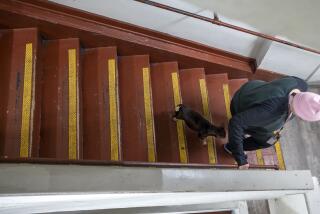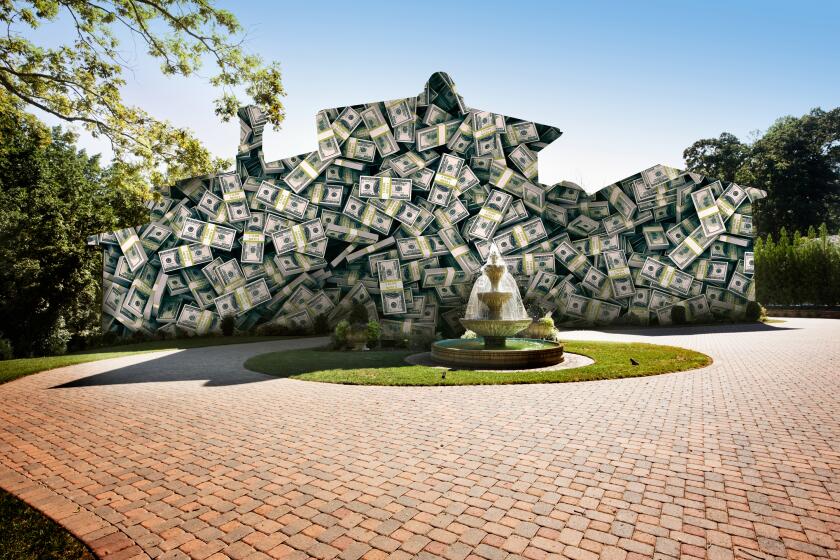Barrington Plaza Case: Tenants Win $100,000 Rebate, Rent Rollback
In resolution of the biggest rent control case ever filed by the City of Los Angeles, tenants of 217 units in the Barrington Plaza apartment complex will share in $100,000 to be paid as restitution for excessive rents, City Atty. James K. Hahn announced Wednesday.
The restitution payment, plus a partial rollback of a 1980 rent increase at the 712-unit high-rise complex in West Los Angeles, were agreed to in an out-of-court settlement that expands an agreement reached last year between the landlord and tenants.
Under terms of the agreement, the defendants, including the charitable Weingart Foundation, its one-time president and a wealthy real estate investor, also agreed to drop efforts to charge tenants for $1.1 million in capital improvement costs.
Clarence E. Jordan, president of the complex’s tenants organization, hailed the agreement as “a compassionate settlement, taking into consideration the age of the tenants,” most of whom are senior citizens.
Jordan said he does not think that any of the 217 tenants involved in the original lawsuit are under age 70 and noted that some have died since the litigation began. He said feedback from the governing organization for the 1,600 residents of the complex is “very good. . . . The settlement is acceptable with much glee.”
Rent Gouging Charge
The city’s 1983 civil complaint accused present and former owners of rent gouging at the complex at 11728 Wilshire Blvd. It alleged overcharges of at least 100 tenants and perhaps twice that number, stating that rents then ranged from about $400 to more than $800 a month.
Named as defendants in the Los Angeles Superior Court suit were the Weingart Foundation, a charity established by the late real estate tycoon Ben Weingart; John Poag of Hawaii, the foundation’s retired president, and Leonard Friedman of San Diego, whose real estate holdings included a partnership in the Hotel Del Coronado near San Diego.
Friedman and the foundation were co-owners of the Barrington Plaza until October, 1982, when Friedman bought out the foundation’s interest for $18 million.
The Times was unable to reach Friedman or his lawyer, Richard S. Hessenius, Wednesday for comment on the settlement.
In Wednesday’s announcement, Hahn noted that part of the agreement was worked out last year with occupants of the 217 units involved in the suit, with the result that those tenants will be paid $100,000 in rent restitution. The earlier negotiations also resulted in agreement to roll back 1% of a 13% annual rent increase imposed in July, 1980.
(The maximum allowed at the time was 7%. Under the current rent control ordinance, increases are limited to the rate of the Consumer Price Index, currently about 4%.)
Attorneys for the defendants could not be reached for comment Wednesday. Earlier, however, they argued that they were entitled to the larger increase because they had been given the green light by the federal Department of Housing and Urban Development, which played a role in the construction of the buildings.
Hahn said the defendants’ agreement to drop efforts to pass on $1.1 million in capital improvements in the form of rent hikes was a key point in the settlement. Under the rent control ordinance, landlords have the right to pass on such costs over a five-year period. If that had occurred, it would have cost Barrington tenants more than an estimated $1,400 per unit during that period, Hahn said.
Jordan said Wednesday that the settlement will “mitigate the most recent 4% rent increase that tenants have been notified of,” which is scheduled to become effective next month.
Deputy City Atty. William Cullen, who handled the case, said the $100,000 restitution--the total of $38,575 in Wednesday’s agreement and $61,425 worked out between tenants and defendants last November--will be paid out on a pro rata basis to surviving tenants involved in the 1983 lawsuit.
More to Read
Sign up for Essential California
The most important California stories and recommendations in your inbox every morning.
You may occasionally receive promotional content from the Los Angeles Times.






